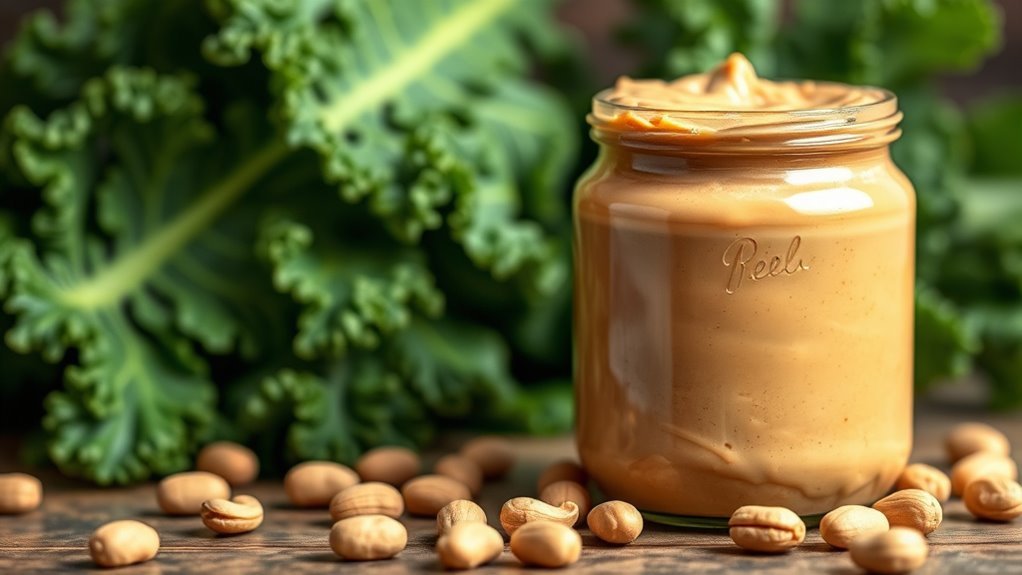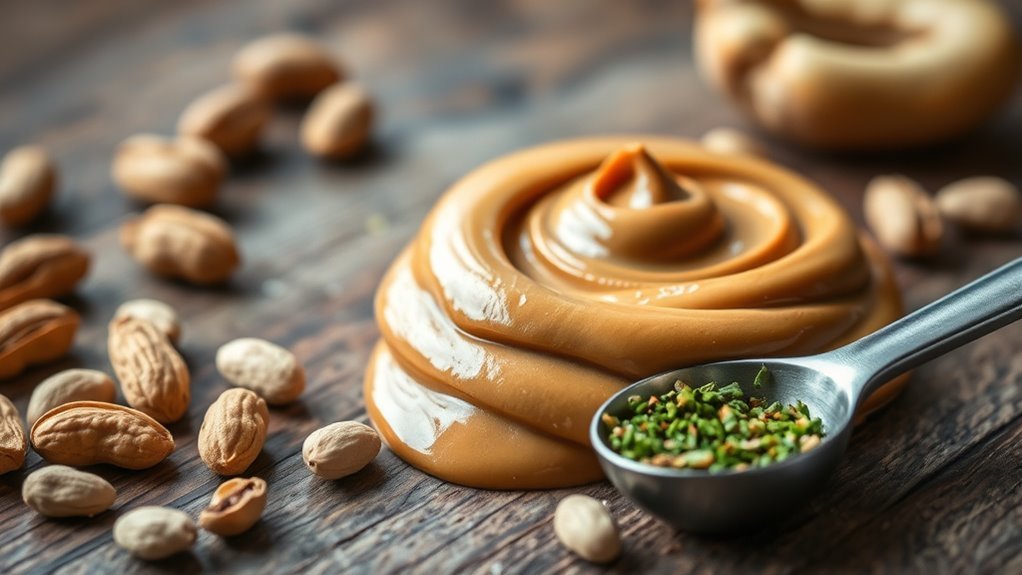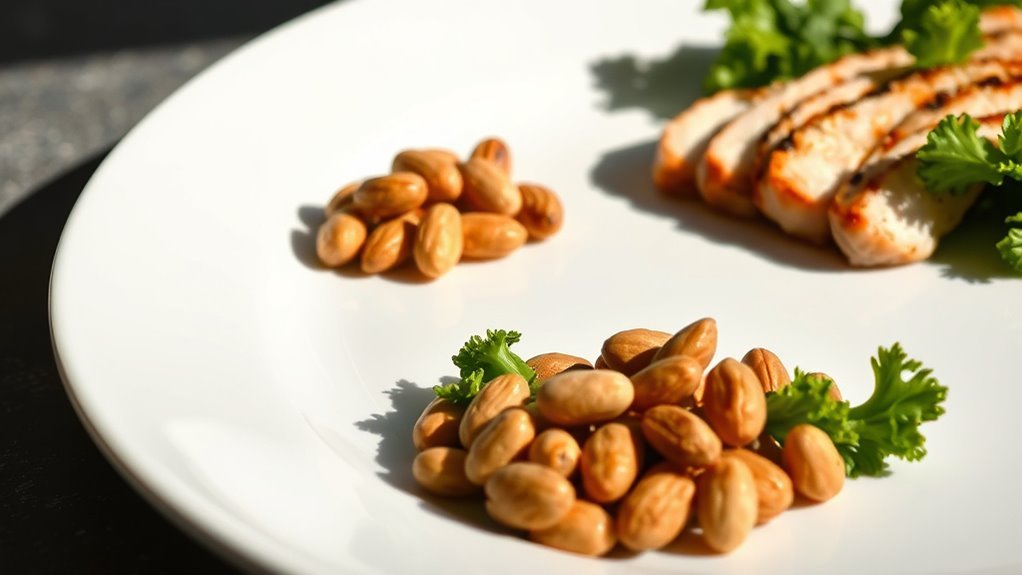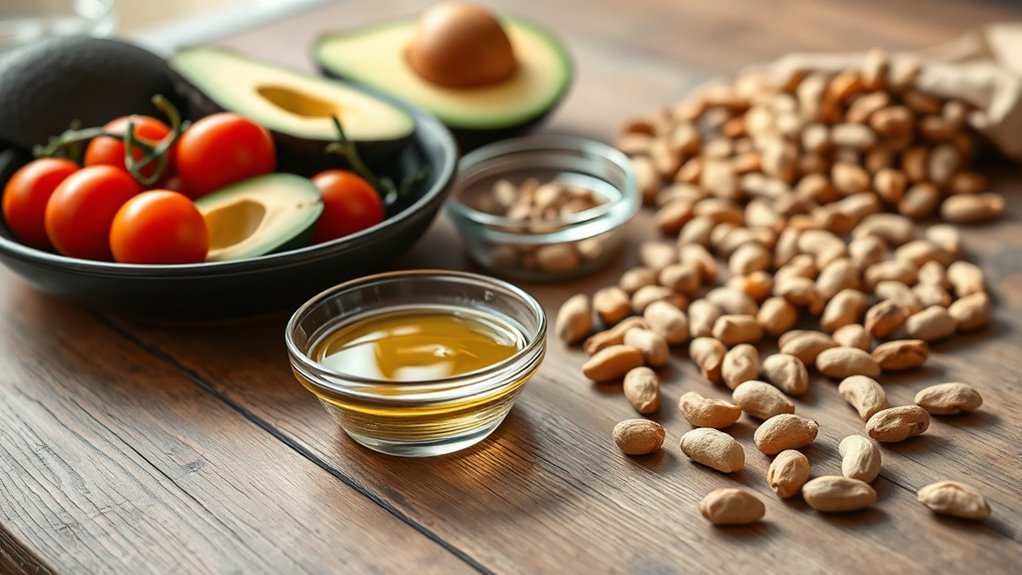Peanuts aren’t ideal for a ketogenic diet due to their relatively high carbohydrate content, which can disrupt your blood sugar stability and hinder ketosis. With about 8 grams of net carbs per ounce, they can lead to insulin spikes that conflict with your keto goals. Instead, opting for lower-carb nuts like macadamias or pecans is more beneficial. If you want to explore better snack options and make informed choices for your keto journey, there’s more to uncover.
Understanding the Ketogenic Diet

When you begin a ketogenic diet, your primary goal is to shift your body into a state of ketosis, where it burns fat for fuel instead of carbohydrates. This process is rooted in ketogenic principles, which emphasize high-fat, moderate-protein, and very low-carbohydrate intake. By drastically reducing carbs, your body learns to rely on fat for energy, leading to fat adaptation. During this changeover, your body adapts its metabolic pathways, enhancing its ability to utilize fatty acids and ketones efficiently. This state not only promotes weight loss but also improves mental clarity and energy levels. Understanding these principles equips you with the knowledge to make informed choices, empowering you to embrace the freedom of a ketogenic lifestyle while enjoying the benefits of fat-based fuel.
The Carbohydrate Content of Peanuts

When considering peanuts on a ketogenic diet, it’s essential to look at their carbohydrate content. Peanuts contain about 6 grams of carbs per ounce, but understanding net carbs is just as important. By subtracting fiber from total carbs, you can better assess how they fit into your daily carbohydrate limit.
Carbs in Peanuts
Have you ever wondered about the carbohydrate content of peanuts? While they might seem like a healthy snack, peanuts contain around 6 grams of carbs per ounce. That’s not a dealbreaker for everyone, but if you’re on a strict keto diet, those carbs can add up quickly. Peanut butter, a popular choice for many, doesn’t fare much better, as it also carries a similar carb load. If you’re seeking low carb alternatives, consider options like almond butter or sunflower seed butter, which tend to have fewer carbs and more healthy fats. Being informed about the carb content in peanuts helps you make better choices on your keto journey, allowing you to enjoy freedom in your food selections without compromising your goals.
Net Carbs Explained
Understanding the concept of net carbs is vital for those adhering to a keto diet, especially when evaluating the carbohydrate content of foods like peanuts. Net carbs are calculated by subtracting dietary fiber from total carbohydrates, as fiber doesn’t greatly impact blood sugar levels. When you look at peanuts, they contain about 16 grams of total carbs per 100 grams, but with roughly 8 grams of dietary fiber, that leaves you with around 8 grams of net carbs. While peanuts might seem permissible at first glance, their higher net carb content can add up quickly. For keto enthusiasts aiming for strict carb limits, it’s important to reflect on how even small amounts of peanuts can affect your overall carb intake.
Insulin Response and Peanuts

While peanuts are often touted for their nutritional benefits, their insulin response can complicate their inclusion in a ketogenic diet. When you consume peanuts, they can cause insulin spikes, which ultimately affects your blood sugar levels. This response can hinder the body’s ability to maintain ketosis, where fat becomes the primary fuel source instead of carbohydrates. The goal of a ketogenic diet is to stabilize blood sugar and reduce insulin levels, allowing you greater freedom in your dietary choices. However, the insulin response triggered by peanuts may counteract these objectives, making them less suitable for a keto lifestyle. To maximize your ketogenic success, it is crucial to choose nuts that maintain stable blood sugar levels without provoking significant insulin responses.
Comparing Peanuts to Other Nuts
When comparing peanuts to other nuts, you’ll notice significant differences in their nutritional profiles and carbohydrate content. While many nuts are low in carbs and high in healthy fats, peanuts generally contain more carbohydrates, which can impact your keto diet. Understanding these distinctions can help you make better choices that align with your dietary goals.
Nutritional Profile Differences
Although peanuts are often grouped with tree nuts, their nutritional profile sets them apart considerably. Peanuts contain more carbohydrates and fewer healthy fats compared to almonds, walnuts, and macadamia nuts, making them less suitable for a keto diet. While they offer protein and fiber, they don’t provide the same nutrient density as tree nuts. If you’re looking for peanut butter alternatives, consider almond or hazelnut butters, which are lower in carbs and higher in healthy fats. These options can easily fit into your keto-friendly snacks, keeping you satisfied without compromising your dietary goals. Choosing the right nuts can make a significant difference in maintaining ketosis and supporting your overall health journey.
Carb Content Comparison
If you’re monitoring your carb intake on a keto diet, it’s important to compare the carb content of peanuts with that of other nuts. Peanuts contain about 6 grams of carbs per ounce, which can be a bit high for strict keto followers. In contrast, many other nuts like macadamias and pecans offer healthier fats with lower carb content, around 1-2 grams per ounce. Choosing these alternatives can help you maintain ketosis more effectively. Almonds are another option, providing approximately 6 grams of carbs but also rich in healthy fats. By opting for these carb alternatives, you can enjoy snacking while staying aligned with your dietary goals. Remember, not all nuts are created equal when it comes to keto!
Nutritional Profile of Peanuts
Peanuts, often mistaken for nuts, are actually legumes that offer a unique nutritional profile. They come with several peanut benefits, including a good source of protein, healthy fats, and essential vitamins. However, they also have peanut drawbacks, primarily their carb content, which may not align with a strict keto diet.
Here’s a quick look at their nutritional values:
| Nutrient | Per 100g | Daily Value (%) |
|---|---|---|
| Protein | 25.8g | 52 |
| Total Fat | 49.2g | 76 |
| Carbohydrates | 16.1g | 5 |
Understanding this profile helps you make informed decisions about including peanuts in your diet while adhering to your nutritional goals.
The Role of Fiber in Keto
Fiber plays an essential role in a keto diet, as it not only aids in digestion but also helps maintain stable blood sugar levels. While your carb intake is low, focusing on high-fiber foods guarantees you still get the benefits of dietary fiber, critical for digestive health. Excellent fiber sources on keto include leafy greens, avocados, chia seeds, and flaxseeds. These foods can help you feel full longer while supporting gut health and reducing the risk of constipation. Incorporating these fiber-rich options into your meals not only enhances your nutritional profile but also aligns with your desire for freedom in choosing healthful foods. Remember, fiber is a key player in making your keto journey sustainable and enjoyable.
Potential Allergies and Sensitivities
While many people enjoy peanuts as a snack, it’s important to take into account potential allergies and sensitivities that can arise from their consumption. Peanut allergies affect millions and can lead to serious health issues. Even if you don’t have a full-blown allergy, you might experience sensitivity reactions, which can be uncomfortable and disruptive.
Peanuts can be a tasty snack, but be aware of potential allergies and sensitivities that may arise from their consumption.
Consider the following:
- Skin rashes or hives
- Digestive issues like bloating or gas
- Respiratory problems, including wheezing
- Anaphylaxis in severe cases
- Cross-reactivity with other legumes
If you suspect you might have a peanut allergy or sensitivity, it’s wise to consult a healthcare professional. Prioritizing your health means being mindful of what you eat, even on a keto diet.
Alternative Snack Options for Keto
If you’re steering clear of peanuts due to allergies or dietary choices, there are plenty of other keto-friendly snack options that can satisfy your cravings without compromising your health. Consider indulging in nut substitutes like sunflower or pumpkin seeds for a satisfying crunch. For something savory, cheese crisps make an excellent low-carb treat. If you’re in the mood for something sweet, energy bites made with coconut snacks provide a delicious boost. Veggie chips can also deliver that satisfying crunch while keeping your carb count low. These healthy alternatives guarantee you stay on track with your keto diet while enjoying a variety of flavors. Embrace these options, and you won’t feel deprived on your journey!
Making Informed Choices on a Keto Diet
Understanding the nuances of a keto diet is essential for making informed choices that align with your health goals. As you commence this journey, consider these key aspects for effective keto meal planning and mindful eating:
Embrace the keto journey by understanding its principles for informed meal planning and mindful eating.
- Prioritize whole, nutrient-dense foods
- Monitor your carb intake carefully
- Incorporate healthy fats for satiety
- Stay hydrated and consider electrolyte balance
- Listen to your body’s hunger cues
Frequently Asked Questions about Why No Peanuts on Keto
1. Why are peanuts not recommended on a keto diet?
Peanuts are often avoided on a keto diet because they contain a relatively high amount of carbohydrates compared to other nuts. While they do have some healthy fats and protein, their carbohydrate content can hinder the state of ketosis, which is essential for the diet’s effectiveness. Consuming too many carbs can knock you out of ketosis, making it challenging to achieve your weight loss and health goals.
2. What is the carbohydrate content of peanuts?
Peanuts contain about 6 grams of carbohydrates per ounce (28 grams), which can add up quickly if you’re not careful. On a strict keto diet, the daily carbohydrate intake is typically limited to around 20-50 grams, meaning that just a small serving of peanuts could take up a significant portion of your daily allowance, potentially disrupting ketosis.
3. Are there any low-carb alternatives to peanuts on a keto diet?
Yes, there are several low-carb nut alternatives that are more suitable for a keto diet. Nuts like macadamia nuts, pecans, and Brazil nuts are excellent options because they contain significantly fewer carbohydrates while being high in healthy fats. These alternatives can provide similar crunch and flavor without compromising your daily carb limits.
4. Can I eat peanut butter on a keto diet?
Traditional peanut butter is generally not recommended on a keto diet due to its carbohydrate content. However, if you choose a natural, no-added-sugar variety and measure your serving size carefully, you might be able to incorporate it in moderation. It’s essential to read labels and ensure that the product does not contain added sugars or hydrogenated oils that can increase carb counts.
5. What are the health implications of eating peanuts on keto?
While peanuts do offer some nutritional benefits, including protein and healthy fats, their high carb content can pose a challenge for those following a strict keto diet. Furthermore, some individuals may be allergic to peanuts or sensitive to them, which can lead to adverse health effects. For optimal health benefits and to maintain ketosis, it’s generally advisable to focus on lower-carb alternatives that align better with keto principles.
References
- https://www.ncbi.nlm.nih.gov/pmc/articles/PMC6511182/
- https://www.healthline.com/nutrition/keto-diet-foods
- https://www.webmd.com/diet/obesity/what-is-the-ketogenic-diet
- https://www.mayoclinic.org/healthy-lifestyle/nutrition-and-healthy-eating/expert-answers/keto-diet/faq-20457966
- https://www.bbc.com/news/health-51117609
- https://www.verywellfit.com/what-is-the-ketogenic-diet-5199211
- https://www.nutrition.org.uk/healthyliving/basics/keto-diet.html


